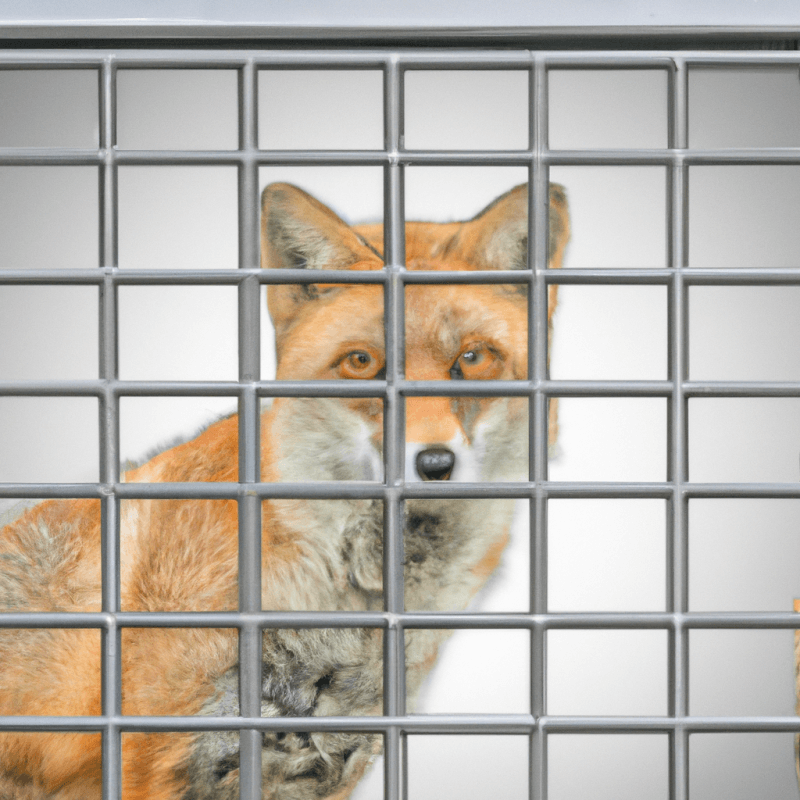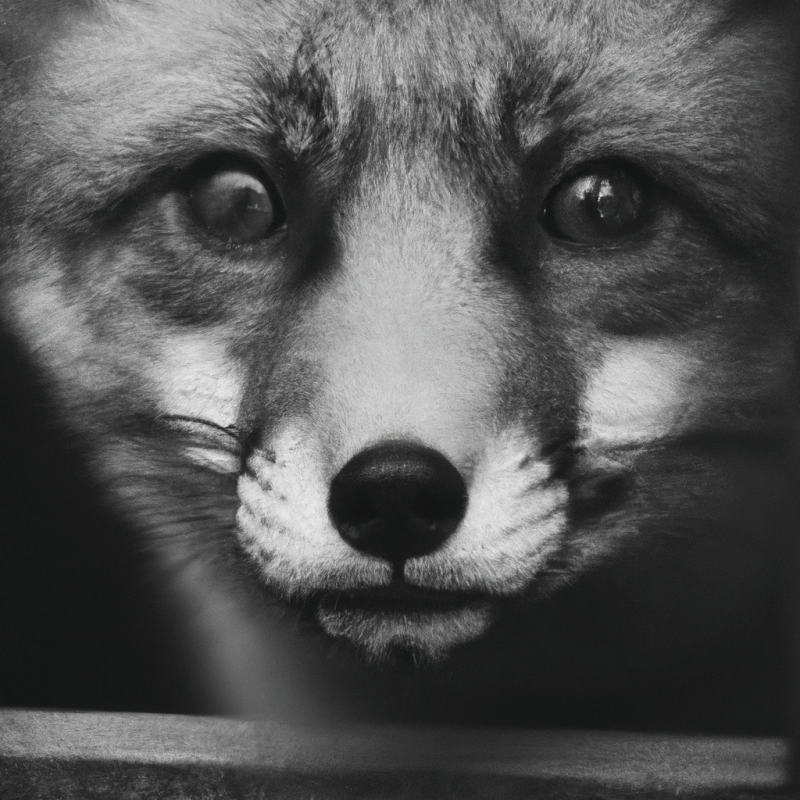Have you ever wondered if owning a fox as a pet is legal? Well, the answer might surprise you. In many parts of the world, owning a fox is indeed legal, as long as you meet certain requirements and obtain the necessary permits. However, it’s important to keep in mind that foxes are wild animals by nature, and their ownership comes with unique challenges and responsibilities. This article will explore the legal aspects of owning a fox as a pet, shedding light on the regulations and considerations involved. So, if you’ve ever been curious about sharing your home with one of nature’s most cunning creatures, keep reading to find out more!

Laws and Regulations
Local Laws
When considering owning a fox as a pet, it is crucial to familiarize yourself with the local laws in your area. Some cities or towns may have specific regulations or ordinances regarding the ownership of exotic animals, including foxes. These laws can vary widely, so it’s essential to check with your local government or animal control agency to ensure you understand the requirements in your area.
Ready for Cat Trivia?
Test your knowledge about cats!

State Laws
In addition to local laws, it is also important to be aware of the state laws regarding fox ownership. Each state has different regulations when it comes to owning foxes as pets. Some states may require permits or licenses, while others may have restrictions on certain fox breeds. Researching and understanding the state laws is crucial to ensure that you are in compliance with the regulations and avoid any legal issues.
Federal Laws
Furthermore, it is vital to consider federal laws that may impact fox ownership. The U.S. Fish and Wildlife Service regulates the importation, sale, and possession of certain exotic species under the Endangered Species Act (ESA) and the Captive Wildlife Safety Act (CWSA). While not all fox breeds are covered under these laws, it is essential to check if the fox breed you intend to keep as a pet falls under any federal regulations.
Domesticated vs. Wild Foxes
Fox Breeds
There are several different fox breeds available for domestication as pets. The most common domesticated fox breed is the silver fox, which has been selectively bred for generations to exhibit more domesticated traits. Other fox breeds that are sometimes kept as pets include the arctic fox and fennec fox. Each breed has its own characteristics, temperaments, and care requirements. When selecting a fox breed, it is crucial to research and choose one that aligns with your lifestyle and capabilities as an owner.
Importance of Breeding
The process of domestication involves selectively breeding animals to exhibit traits that are more suited for coexistence with humans. Domesticated foxes have undergone this selective breeding process for many generations, resulting in genetic changes that make them more amenable to living as pets. Proper breeding practices are essential to ensure the well-being and temperament of the foxes. Reputable breeders follow ethical standards to maintain the health and behavioral traits necessary for a successful pet-owner relationship.
Hybrid Foxes
Hybrid foxes, also known as crossbred foxes, are the result of breeding a domesticated fox with a wild fox. While some hybrid foxes may exhibit traits that are desirable to certain enthusiasts, they can pose challenges when it comes to temperament and care. It is important to note that hybrid foxes may not possess the same domesticated traits as fully domesticated foxes. Additionally, the breeding of hybrid foxes may raise ethical concerns due to potential negative impacts on the health and welfare of the animals involved.
Permits and Licenses
Pet Fox Permits
Many states require permits or licenses to own a fox as a pet. These permits are typically issued by state wildlife agencies or departments of agriculture. The purpose of these permits is to ensure that the owners meet specific requirements and standards for the well-being and safety of the fox. The application process for pet fox permits generally involves providing information about the housing and care plans for the fox, as well as paying any necessary fees. It is crucial to research and adhere to the permit requirements in your state to legally own a fox as a pet.
Wildlife Rehabilitation Permits
In some cases, individuals may come across a wild fox that requires rehabilitation due to injury or abandonment. Wildlife rehabilitation permits are typically required to provide care to injured or orphaned wildlife, including foxes. These permits are issued by state or federal wildlife agencies and involve specific training and certification requirements. It is important to note that wildlife rehabilitation permits are distinct from permits to keep a fox as a pet and may have different regulations and restrictions.
Health and Vaccinations
Rabies Vaccinations
Rabies vaccinations are crucial for the health and safety of both the fox and its owner. While foxes are not considered a high-risk species for rabies transmission, they can still contract and transmit the disease. It is essential to consult with a veterinarian experienced in fox care to determine the appropriate vaccination schedule and to ensure that the fox is up to date on its rabies vaccinations. In many areas, proof of rabies vaccination is required for fox ownership.
Other Required Vaccinations
In addition to rabies vaccinations, there may be other vaccinations recommended or required for pet foxes. These vaccinations can vary depending on the region and the specific health risks in the area. It is crucial to consult with a veterinarian to determine the appropriate vaccinations for your fox and to establish a preventative healthcare routine that includes regular check-ups and vaccinations to keep your fox healthy.
Veterinary Care
Regular veterinary care is essential for the overall health and well-being of your pet fox. Foxes, like any other animal, can develop various health issues that require professional medical attention. Finding a veterinarian with experience in treating foxes is crucial, as they can provide valuable guidance on nutrition, preventative care, and any specific health concerns related to foxes. Regular check-ups, vaccinations, and proper medical care are necessary to maintain the health of your pet fox.

Housing and Environment
Indoor vs. Outdoor Housing
When it comes to housing a pet fox, there are two main options to consider: indoor and outdoor housing. Indoor housing provides a controlled environment that protects the fox from harsh weather conditions and potential predators. It is essential to create a safe and comfortable indoor space for the fox, including a designated sleeping area, space to move around, and access to litter boxes or waste management systems. Outdoor housing, on the other hand, requires a secure enclosure that provides protection from predators, adequate shelter, and space for the fox to exercise and explore.
Fencing and Enclosure Requirements
For outdoor housing, it is important to ensure the enclosure is secure and meets the specific requirements for foxes. Foxes are known for their ability to dig and climb, so the enclosure should have a sturdy fence that extends both above the ground and below the surface to prevent escapes. A fence with a height of at least six feet is typically recommended. The enclosure should also include shelter, such as a weatherproof and insulated den or house, and areas for the fox to exercise and play. Regular inspections of the enclosure and repairs are essential to maintain its integrity.
Enrichment and Socialization
Foxes are intelligent and active animals that require mental stimulation and socialization to thrive. Providing enrichment activities, such as puzzle toys, hiding treats, or interactive play, can help prevent boredom and destructive behaviors. Foxes are also known to form strong social bonds, so it is beneficial to provide opportunities for social interaction. It is important to note that foxes may not necessarily make good companions for other pets, so careful introductions and supervision are crucial to ensure everyone’s safety and well-being.
Diet and Nutrition
Fox’s Natural Diet
Understanding the natural diet of a fox is essential for providing appropriate nutrition. Foxes are omnivores with a diet that consists of both animal and plant-based foods. In the wild, their diet typically includes small mammals, birds, reptiles, insects, fruits, and berries. When keeping a pet fox, it is important to replicate this balanced diet as closely as possible. Providing a variety of protein sources, such as lean meats and insects, along with fruits, vegetables, and high-quality commercial fox food, can help ensure a well-rounded diet for your pet fox.
Commercial Fox Food
There are commercial fox foods available on the market that are specifically formulated to meet the nutritional needs of pet foxes. These foods are often nutritionally balanced and can provide a convenient option for feeding your fox. However, it is essential to choose a reputable brand and consult with a veterinarian to ensure that the food meets the specific dietary requirements of your fox breed. Commercial food should be used as part of a well-rounded diet that includes a variety of fresh and natural foods.
Supplements and Treats
In addition to a balanced diet, foxes may benefit from certain dietary supplements or treats. Omega-3 fatty acids, for example, can support the overall health and coat condition of a fox. It is important to consult with a veterinarian to determine if any supplements are necessary for your pet fox and to ensure that they are safe and appropriate for their specific needs. Treats, while enjoyable for the fox, should be given in moderation and as a supplement to their regular diet to maintain a healthy weight.

Behavioral Needs
Exercise and Stimulation
Like any other active and intelligent animal, foxes require regular exercise and mental stimulation to thrive. Providing opportunities for physical activity, such as supervised outdoor playtime or access to a safe and secure outdoor enclosure, can help meet their exercise needs. Additionally, engaging in interactive play with toys, puzzle feeders, and other enrichment activities can help keep their minds stimulated and prevent boredom. It is important to ensure that the exercise and stimulation provided are appropriate for the specific needs and energy levels of your pet fox.
Training and Behavioral Challenges
Training a pet fox can be both rewarding and challenging. Foxes are known for their intelligence and can learn various commands and tricks. However, it is important to approach training with patience, consistency, and positive reinforcement methods. Foxes can be independent and may require more time and effort than traditional pets to learn desired behaviors. It is important to be aware of potential behavioral challenges, such as digging, marking, or vocalizing, and to address them with appropriate training techniques to promote a harmonious pet-owner relationship.
Interaction with Other Pets
When bringing a fox into a household with other pets, careful introductions and ongoing supervision are necessary to ensure everyone’s safety. Foxes have their own instincts and behaviors, which may not align well with other domesticated animals. Some foxes may see small pets, such as rabbits or cats, as prey, while others may be more social and able to coexist peacefully. Proper introductions, gradual socialization, and ongoing supervision are essential to prevent conflicts and ensure the well-being of all animals involved.
Sourcing a Pet Fox
Registered Breeders
Registered breeders are individuals or businesses that specialize in breeding and raising pet foxes. Working with a registered breeder can provide certain advantages, such as assurance of the fox’s breed, health history, and adherence to ethical breeding practices. Registered breeders often have expertise in the care and well-being of foxes and can provide valuable guidance and support to new fox owners. It is crucial to research and choose a reputable breeder who prioritizes the welfare of their animals and has a track record of ethical practices.
Animal Shelters and Rescues
In some cases, individuals may choose to adopt a fox from an animal shelter or rescue organization. These organizations work to rescue and rehome animals in need, including foxes. Adopting from a shelter or rescue can provide a loving home to a fox in need and give you the opportunity to provide a second chance at life. It is important to be aware that foxes in shelters or rescues may have different backgrounds, experiences, and care requirements. Consulting with the shelter or rescue organization can provide insight into the specific needs of the fox you are considering adopting.
Private Sales
Private sales involve purchasing a fox directly from an individual who may breed or own foxes as a hobby or side business. Unlike registered breeders, private sellers may not have the same level of knowledge or experience in fox breeding and care. It is crucial to research and thoroughly evaluate any private seller you consider purchasing a fox from. Assessing the conditions in which the animals are kept, asking about health records and previous litters, and gathering as much information as possible can help ensure that you are making an informed decision and purchasing a fox from a responsible source.

Potential Risks and Concerns
Zoonotic Diseases
Zoonotic diseases are illnesses that can be transmitted between animals and humans. While foxes do not pose a significant zoonotic disease risk, it is still important to practice good hygiene and take necessary precautions when handling or interacting with foxes. Regular handwashing, proper handling techniques, and avoiding contact with fox feces or bodily fluids can help reduce the risk of zoonotic diseases. It is also important to consult with a veterinarian to ensure that your fox is up to date on its vaccinations and preventative healthcare.
Escapes and Invasive Species
Foxes are known for their agility and ability to escape enclosures if not properly secured. Escaped foxes can pose risks to themselves and the environment. They may become a nuisance or even establish populations in areas where they are not native, potentially disrupting local ecosystems. It is crucial to ensure that the fox’s enclosure is secure and designed to prevent escapes. Regular inspections, maintenance, and using appropriate fencing materials can help mitigate the risk of escapes and reduce the negative impact on the environment.
Legal Consequences
Failure to comply with the laws and regulations regarding fox ownership can result in legal consequences. This may include fines, seizure of the fox, or other legal actions. It is essential to research and understand the specific laws in your local area, state, and at the federal level to ensure that you are in compliance. Obtaining the necessary permits or licenses, following proper care guidelines, and staying informed about any changes in the laws can help prevent legal issues and ensure a responsible and legal ownership of a pet fox.
Ethical Considerations
Wildlife Conservation
Wildlife conservation is an essential aspect to consider when contemplating owning a pet fox. Foxes are wild animals, and their populations face various challenges in their natural habitats. It is important to support and participate in conservation efforts that protect the natural habitats of foxes and promote their well-being in the wild. By respecting and appreciating the natural behaviors and needs of foxes, as well as supporting conservation organizations and initiatives, we can contribute to the long-term conservation of these fascinating creatures.
Supporting Responsible Ownership
Responsible ownership of a pet fox involves providing proper care, meeting their physical and behavioral needs, and respecting their unique qualities as wild animals. Responsible owners ensure their pet foxes receive proper veterinary care, a balanced diet, appropriate housing, and mental enrichment. They also follow all applicable laws, regulations, and permit requirements to ensure the safety and well-being of the fox and the surrounding community. Supporting and promoting responsible ownership helps protect the welfare of pet foxes and contribute to their positive reputation as pets.
Alternatives to Pet Foxes
Owning a fox as a pet is a significant commitment that requires careful consideration and preparation. For those who may be unsure about their ability to meet the specialized needs of a fox or are unable to obtain the necessary permits, there are alternative ways to enjoy and appreciate these fascinating animals. Visiting wildlife sanctuaries, wildlife photography, volunteering at rescue organizations, or supporting research and conservation efforts can provide opportunities to observe and learn about foxes while respecting their wild nature. These alternatives allow for a meaningful connection with foxes without the responsibilities and challenges associated with owning them as pets.



